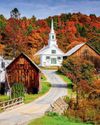As a new trail opens up one of Tasmania’s wildest beauty spots, we explore the island’s convict history and bright future.

We made our break for it. The boat cleared the jetty, leaving behind the ghostly remnants of 19th-century colonial justice: dour penitentiary, military barracks, lunatic asylum. Straight ahead, a squat lump of mudstone: the Isle of the Dead, final resting place of over 1,100 souls (o cers in marked graves, convicts in mass ones). Beyond that, navy waters, kelp gulls and our destination: Port Arthur inlet’s forested far shore.
However, there was no rush. We spent an hour skimming down the sound and back, past sea caves and fur seals, before edging into the emerald shallows of Denmans Cove. Ramp lowered, we walked onto its squeaky white sand, along a creek and into the bush. Across the inlet, the prison ruins were now barely visible through a smugglers’ mist. Our escape from Port Arthur, once the most feared address in all of Australia, had been a leisurely affair. How times change.
Established on Tasmania’s Tasman Peninsula in 1830, Port Arthur began life as a timber station but soon became a jail for Australia’s worst. Its inmates weren’t fresh-off-the-boat transportees but convicts who committed further offences once they’d arrived. Despite that, it was a prison with no walls. Connected to the rest of the mainland by only a narrow, well-guarded isthmus, tucked into a secretive inlet and surrounded by hostile bush and shark-infested seas, Port Arthur’s geography kept the inmates in.
Despite its horrors, that geography also made it beautiful. The Tasmanian Steam Navigation Company described it about right in its 1887 brochure: ‘A spot as lovely in its position as it is ugly in its memories’. Tourists started visiting just three months after the penal colony closed in 1877, drawn by Port Arthur’s macabre reputation and incongruous natural splendour.
この記事は Wanderlust Travel Magazine の September 2016 版に掲載されています。
7 日間の Magzter GOLD 無料トライアルを開始して、何千もの厳選されたプレミアム ストーリー、9,000 以上の雑誌や新聞にアクセスしてください。
すでに購読者です ? サインイン
この記事は Wanderlust Travel Magazine の September 2016 版に掲載されています。
7 日間の Magzter GOLD 無料トライアルを開始して、何千もの厳選されたプレミアム ストーリー、9,000 以上の雑誌や新聞にアクセスしてください。
すでに購読者です? サインイン

Vermont, USA
The Wanderlust team relocated to New England for part of this issue, as we explored a lush state filled with outdoor escapes, historic towns... and lashings of maple syrup

Unique North America
See a side to the USA and Canada beyond the big cities and discover incredible stories and special wildlife with our pick of the trips

The call of the Rockies
From historic ski lodges to rustic backcountry cabins and a mock-Scottish castle, we pick the stays in Canada's Rocky Mountains that make the most of their setting

A new dawn for the Garifuna community
When the Garifuna people settled in Belize, they had to carry their traditions and culture with them; now a new trail is inviting visitors to explore this heritage through local communities

On the edge of history
In south-west Colorado lies the largest archaeological preserve in the USA, a series of vast cliff dwellings whose residents 'vanished' overnight. But was the answer to their disappearance in plain sight?

Tigers burning bright
As India celebrates 50 years of its Project Tiger conservation scheme, we visit the reserves of Madhya Pradesh to see how its success has impacted a tiger population that once looked in danger of disappearing

SEASON'S GREETINGS
From fiery fall foliage to art fairs and harvest festivals, opens up a wealth of across the USA and Canada autumn experiences

Waking a sleeping GIANT
A slow drive along the North Wales Way, from the English border to Anglesey, reveals not only a land of incredible local food and castles, but a region that is slowly reimagining itself

The rebirth of old JEDDAH
As efforts to restore Al-Balad, Jeddah's historical district, take hold, we get an exclusive peek at how art and culture are taking centre stage

Star-studded escapes
Wilderness, history and wildlife combine at some of Britain's most iconic stargazing sites, as more and more travellers are looking to the heavens